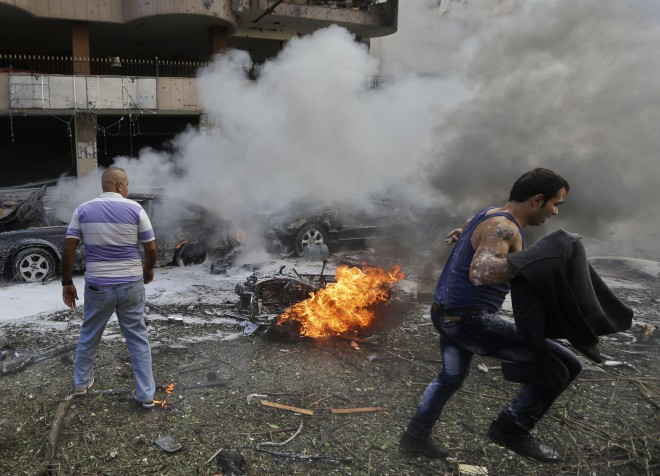
A Lebanese man runs in front of a burned car, at the scene where two explosions have struck near the Iranian Embassy killing 23, in Beirut, Lebanon, Tuesday Nov. 19, 2013. The blasts in south Beirut’s neighborhood of Janah also caused extensive damage on the nearby buildings and the Iranian mission. The area is a stronghold of the militant Hezbollah group, which is a main ally of Syrian President Bashar Assad in the civil war next door. AP PHOTO/HUSSEIN MALLA
BEIRUT—A double suicide bombing outside the Iranian embassy in Beirut killed at least 23 people on Tuesday, in an attack claimed by an Al-Qaeda-linked jihadist group.
The army said a motorcyclist blew himself up moments before a suicide bomber driving a four-wheel-drive detonated his payload in the southern Beirut stronghold of Hezbollah, an ally of both Iran and the regime of Syrian President Bashar al-Assad.
The mid-morning attack, which the health ministry said also wounded 146 people, was the first time the Iranian mission has been targeted.
The blasts ripped the facades off surrounding buildings, strewing rubble and glass on streets that were stained with blood.
Residents walked dazed past charred cars and trees, as soldiers and Hezbollah security men tried to secure the area.
The attack follows two other bombings this year in Hezbollah bastions in Beirut, amid rising tensions over the conflict in neighbouring Syria.
Iran is one of Syria’s closest allies, and is the key sponsor of Hezbollah, a powerful Shiite movement that has dispatched thousands of fighters to bolster the regime in the 32-month uprising.
The blasts were claimed by the Abdullah Azzam Brigades, a jihadist group linked to Al-Qaeda that has previously fired rockets at Israel from Lebanese territory.
“This is a double martyrdom operation carried out by two heroes from the heroic Sunnis of Lebanon,” Sirajeddin Zreikat, a member of the group, wrote on Twitter.
Syrian state television said the “government firmly condemns the terrorist attack carried out near the Iranian embassy in Beirut.”
It said an “odor of petrodollars comes from all the terrorist acts against Syria, Lebanon and Iraq,” an apparent reference to Saudi Arabia and Qatar, which back Syria’s uprising.
Iranian foreign ministry spokeswoman Marzieh Afkham accused Israel and its “mercenaries” of responsibility.
Israel immediately denied involvement
Speaking in Rome, Iranian Foreign Minister Mohammed Javad Zarif said “the tragedy today… should be an alarm for all of us that we need to deal with and unless we deal with it seriously, it will engulf all of us.”
Asked about Afkham’s claim about Israel, he said “we have reason to be suspicious of every move they make.”
For his part, a Hezbollah MP blamed a “Western-Israeli alliance” and regional powers that back radical Sunni “takfiri” groups for the attacks.
“The aim (of the attacks) is to advance the program of murder, sabotage and chaos, threatening national unity and targeting stability,” said Mohammad Raad.
“The program is being followed by a Western-Israeli alliance, whose interests intersect with those of regional powers and takfiri groups,” he added, referring to radical Sunni extremists.
Britain and France issued swift statements of condemnation, and UN chief Ban Ki-moon urged restraint.
The army confirmed the double suicide bombing, saying “the first explosion was caused by a suicide attacker who was driving a motorcycle and blew himself up. The second suicide attacker was driving a 4×4 vehicle and also detonated himself.”
Iranian Ambassador Ghazanfar Rokn-Abadi said all staff inside the embassy at the time escaped unharmed.
But officials in Tehran said the cultural advisor, Ibrahim al-Ansari, was in critical condition after the blast.
By early evening, a medical official confirmed Ansari had died of his injuries.
Coincidentally, Lebanon and Iran’s football teams were due to play in Beirut on Tuesday, and the match went ahead, but with fans banned from attending.
‘Act of savagery’
An AFP correspondent at the scene described blood and glass on the streets, and media broadcast harrowing images of charred bodies, some still on fire.
One shocked resident said the attack was an act of “savagery.”
“People want to live. After this kind of thing we are paralysed for days. Thank God my children were at school,” said Farah, a woman in her 30s.
At the nearby Rasul Aazem hospital, which received seven bodies from the blasts, relatives waited to hear news of their loved ones while others queued to donate blood.
At the Zahraa hospital, Mohamed al-Hajj was searching for his neighbor Tariq.
“He works in front of the embassy and now we don’t know where he is. We checked all the hospitals,” he told AFP.
Hezbollah has already seen its strongholds in southern Beirut targeted twice by car bombs this year, on July 9 and August 15.
While the first attack caused no fatalities, the second car bomb killed 27 people.
Hezbollah’s involvement in Syria has angered many Lebanese Sunni Muslims who back the country’s opposition.
It has also raised fears Lebanon could be engulfed by the Syrian conflict, which has killed more than 120,000 people since March 2011.
But Hezbollah chief Hassan Nasrallah pledged just last week that he would not withdraw his forces.
“We have said on several occasions that the presence of our soldiers on Syrian soil is to defend… Syria, which supports the resistance” against Israel, he said.—Serene Assir